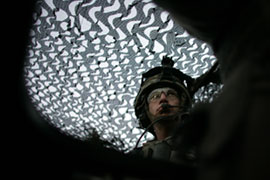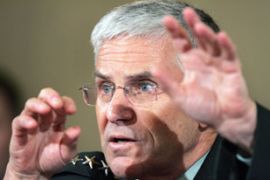US commander denies Iraq failure
General Casey says Baghdad can be secured with fewer US troops than are being sent.
The new strategy will see more than 21,500 soldiers added to the 138,000-strong US force in Iraq and deployed mainly in Baghdad.
New strategy
“I believe the president’s new strategy will enhance the policy we have,” Casey said.
Casey, who has been nominated to become the army’s chief of staff after two and a half years in Iraq, helped draw up the plan but it will fall to his successor, General David Petraeus, to carry it out.
“I do believe the job in Baghdad as it’s designed now can be done with less than that. But having the other three brigades on a deployment cycle gives General Petraeus great flexibility,” he added.
Casey repeatedly said during his time in Iraq that his “general view” was that the deployment of additional US forces prevented Iraqi security forces from assuming responsibility for their own country.
He said: “My general belief is I did not want to bring one more soldier into Iraq than was necessary to accomplish the mission.
“And so what I asked for was the two brigades and the ability to maintain a reserve in Kuwait in case I needed additional flexibility.”
Intense questioning
Casey faced intense questioning from John McCain, a Republican senator, who questioned his judgement and cited the general’s past prediction that his strategy would allow a reduction in US forces by late 2005.
“We have paid a very, very heavy price in American blood and treasure because of what is now agreed to by literally everyone as a failed policy,” McCain said.
Casey replied: “I do not believe that the current policy has failed.”
“The struggle in Iraq is winnable but it will … take patience and will.”
His strategy of training and equipping Iraqi security forces to assume control over the country came under attack from other senators on the committee.
Responsibility
Meanwhile, legislators on both sides of the US senate drummed up support for a compromise bill criticising an increase in US forces in Iraq, saying it was the best chance of forcing the president to drop his unpopular plan.
After days of hardknuckle bargaining, top congressional Democrats and key Republicans finally agreed late on Wednesday on a bill that censures Bush’s plan to boost US forces in the war zone with another 21,500 troops.
 |
More than 21,500 troops are being added to
the 138,000-strong US force in Iraq [AFP] |
The breakthrough measure, likely to garner wide support, means the White House could face an embarrassing – but ultimately symbolic – vote of no-confidence when the bill hits the senate floor next week.
Joe Biden, one of the key authors of the motion, said: “Now we have a real opportunity for the senate to speak clearly. Every senator will have a chance to vote on whether he or she supports or disagrees with the president’s plan to send more troops into the middle of a civil war.”
The bill tries to gin up “bipartisan opposition to his plan, because that was the best way to get him to reconsider,” he said.
John Warner, a Republican senator who penned the other motion, said the fusion of the two bills offered the best chance of swaying Bush to change course in Iraq.
“We urge the president to look at all options to charge the Iraqis with a greater and greater degree of the new plan in Baghdad,” Warner told a Senate hearing.

